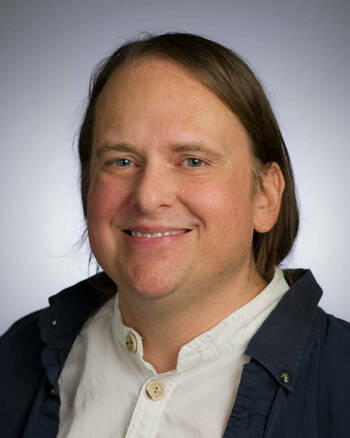In memoriam: Benjamin Radcliff, professor of political science

Benjamin Radcliff, a professor in the Department of Political Science at the University of Notre Dame, died June 10 after a long illness. He was 60.
Radcliff’s scholarly work focused on the intersection of American and comparative politics. He made significant research contributions in three primary areas: social choice theory, the political influence of organized labor and the politics of human happiness.
“He was a prolific scholar, pioneering the study of how political systems influence what he would call the ultimate dependent variable: human happiness,” said Matthew E.K. Hall, the David A. Potenziani Memorial College Professor of Constitutional Studies and director of the Rooney Center for the Study of American Democracy. “He liked to project a cantankerous, sarcastic persona, but it did little to persuade me that he was anything less than a saint.”
From Ottawa, Illinois, Radcliff received his doctorate in political science at the University of Illinois Urbana-Champaign. He held faculty positions at Rutgers University and Vanderbilt University for two years each, and was part of Notre Dame’s political science department for 30 years. During his tenure, Radcliff served as the director of graduate studies for six years and as the director of the Rooney Center from 2012 through 2013.
His book “The Political Economy of Human Happiness: How Voters’ Choices Determine the Quality of Life” detailed his research on the connection between government support for citizens and workers and overall human happiness. Radcliff also completed two edited volumes and 45 referred journal articles, 14 of which appeared in the three leading journals in political science: the American Political Science Review, the American Journal of Political Science and the Journal of Politics.
From 2019 through 2022, with department chair and professor Geoffrey Layman, Radcliff served as the co-editor-in-chief of Political Behavior — the official journal of the elections, public opinion and voting behavior organized section of the American Political Science Association. In this position, Layman said, Radcliff was known for his thorough feedback, and he often kindly explained his reasonings to authors whose manuscripts he rejected.
“Ben not only helped the journal reach new heights in terms of scholarly impact and ranking, but also was an exceedingly caring and thoughtful editor,” Layman said.
Beyond academia, Radcliff was also known for his ability to engage in enlightening conversations on subjects ranging from history and politics to music, literature, wine and arcane trivia. With his wife, Amy, Radcliff published the book “Understanding Zen,” which examined zen as a secular doctrine without any necessary relationship to Buddhism or Eastern culture. He also wrote an article on “The Beer Renaissance” in Sky, the Delta Airlines magazine.
“In short, Ben did not just study human happiness, he actively contributed to it,” Layman said.
Radcliff is survived by his wife, as well as his mother, brother and many nieces and nephews. A celebration of life is scheduled to be held in August. Those who wish to honor his memory with a donation can do so at Heifer International using the link set up by his colleagues.
Originally published by at al.nd.edu on July 3.
Latest Colleges & Schools
- Democrats and Republicans agree on one thing: Censoring hate speechIn an era of intense polarization, Democrats and Republicans have historically, and mistakenly, believed that members of the other party prioritize protecting certain types or victims of hate speech over others based on stereotypes or their affiliation with those potentially vulnerable groups. New research from the University of Notre Dame, however, revealed that partisans generally agree on what to censor when it comes to the target, source and severity of hate speech.
- Economist Kirk Doran wins UK’s Panmure House Prize honoring interdisciplinary researchKirk Doran, an associate professor in the Department of Economics at Notre Dame, has won the 2024 Adam Smith Panmure House Prize. The prize, named after the forefather of economics, celebrates those who embody Smith’s empiricism and long-term interdisciplinary thinking in their research.
- Political scientist explores extending constitutional duties to private actorsNew research from Christina Bambrick, the Filip Family Assistant Professor of Political Science at Notre Dame, explores the nonconventional idea that each of us, as private citizens, may be responsible for upholding the constitutional rights of our fellow citizens. She examines constitutional politics across the globe to explore these different approaches to balancing rights and responsibilities in a democratic society.
- Six new faculty join psychology department to advance research on mental health, other disordersThe Department of Psychology at the University of Notre Dame has hired six new faculty members this year, a significant expansion of a field that is core to the University’s commitment to fighting the U.S. mental health crisis.
- Keough School invites members of the community to join in International Day of Peace eventsThe Keough School of Global Affairs will observe the International Day of Peace with two campus events: a prayer service featuring University President Rev. Robert A. Dowd, C.S.C., on Friday (Sept. 20) and a talk by a Notre Dame graduate who serves in the Sierra Leone government on Tuesday (Sept. 24). Both events are free and open to the public.
- Former Irish prime minister to speak at Notre DameLeo Varadkar, former prime minister of Ireland and current member of parliament in Dáil Eireann, will join the Keough-Naughton Institute for Irish Studies, part of Notre Dame's Keough School of Global Affairs, for a public discussion of Irish current affairs including public health initiatives, civic life and the political future of the island of Ireland. “A Conversation with Deputy Leo Varadkar” will take place from 3 to 4:30 p.m. on Sept. 20 (Friday) in the Hesburgh Center Auditorium. The event is free and open to the public.













